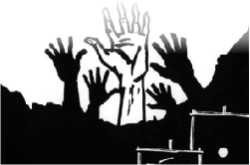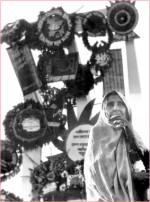|
Spotlight
Dhaka University- Cradle of Language Movement
Muhammad Shafaq Hussain

 The Language Movement (Bangla Bhasha Andolon) was a political and cultural movment in Bangladesh (then East Pakistan) that centred around the recognition of the Bengali language as an official language of Pakistan and a broader reaffirmation of the ethno-national consciousness of the Bengali people. Discontent against Pakistan's "Urdu-only" policy had spilled into mass agitation since 1948 and reached its climactic strength after police fired upon and killed student demonstrators on February 21, 1952. The Language Movement (Bangla Bhasha Andolon) was a political and cultural movment in Bangladesh (then East Pakistan) that centred around the recognition of the Bengali language as an official language of Pakistan and a broader reaffirmation of the ethno-national consciousness of the Bengali people. Discontent against Pakistan's "Urdu-only" policy had spilled into mass agitation since 1948 and reached its climactic strength after police fired upon and killed student demonstrators on February 21, 1952.
Since then every 21st February we remember the value and history of Language. We remember those heroes who gave their life for the Language Movement on 21st February, 1952. Language Movement
After the creation of Pakistan in 1947, the central government under Muhammad Ali Jinnah ordained Urdu to be the sole national language, even though the Bengali-speaking peoples formed a majority of the national population. The policy, compounded by sectional tensions served as a major provocation of political conflict.
“ Mr. Jinnah made a statement in the Constituent Assembly on 25th February, 1948 that Pakistan being a Muslim state URDU would be its state language. Quaid-E-Azam Md. Ali Jinnah was to visit DU during his stay in East Bengal (Bangladesh) in 1948. The students asked Khwaja Nazimuddin (chief minister of East Bengal at that time) to put forward their demand for Bengali to be accepted as one of the state languages of Pakistan. But apparently he didn't convey that to Mr. Jinnah. The founder of the nation told them during his speech on 19th March, 1948 that URDU alone will be the lingua franca of Pakistan ” [by Lt. Gen. (retd) Kamal Matinuddin; Tragedy of Errors, East Pakistan Crisis 1968-1971]
 Despite protests in 1948, the policy was protected into law and reaffirmed by national leaders, including several Bengali politicians. Facing rising tensions, the government in East Pakistan outlawed public meetings and gatherings. Defying this, the students of DU and other political activists started a procession on February 21. Near the present Dhaka Medical College Hospital, police fired on the protesters and as a result Abdus Salam, Rafiq Uddin Ahmed, Abul Barkat, Abdul Jabbar and some unknown people were killed. The deaths of the students served to provoke widespread strikes and protests. Despite protests in 1948, the policy was protected into law and reaffirmed by national leaders, including several Bengali politicians. Facing rising tensions, the government in East Pakistan outlawed public meetings and gatherings. Defying this, the students of DU and other political activists started a procession on February 21. Near the present Dhaka Medical College Hospital, police fired on the protesters and as a result Abdus Salam, Rafiq Uddin Ahmed, Abul Barkat, Abdul Jabbar and some unknown people were killed. The deaths of the students served to provoke widespread strikes and protests.
The Language Movement served as a catalyst for the assertion of the Bengali cultural and national identity within Pakistan. The agitation also served to intensify the political and sectional rivalries between the two wings. The movement served as an inspiration and forerunner to Bengali nationalist agitations against the political and economic domination of West Pakistan, including the 6-point movement and subsequently the Bangladesh Liberation War in 1971.
In Bangladesh, February 21 is commemorated annually as the Language Movement Day. The Shaheed Minar was constructed to commemorate the agitation and pay homage to its victims. In 1999, February 21 was declared the International Mother Language Day by the United Nations.
Copyright
(R) thedailystar.net 2007
|
